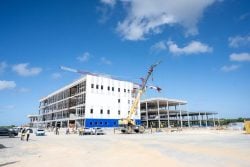Dear Editor,
It was expected that a large section of the Guyanese population would have been outraged or deeply concerned with the views expressed in the Sunday Stabroek editorial of May 18, 2008 captioned ‘Normality.’
This outrage may have stemmed from the belief that the opinion expressed by the editor might be lopsided and intended to castigate a certain section of the populace. Further, given that this section of the population has faithfully supported SN it feels deceived that SN can possibly hold what is perceived as dismissive and derogatory views about it.
The editorial was an opinion piece on the PNCR-led March of May 15, 2008. Thus, inherent to the contention which subsequently emerged among readers is the whole notion of how these protesters are viewed by the newspapers they so passionately encourage their friends and family to support. A support, they contend, which must not go to the Chronicle, which has repeatedly demeaned them and their protest action. During the protest days of the late Desmond Hoyte and the PNCR, these people who exercised the freedom to protest were labelled by the state media and their cohorts as hooligans, mobsters, terrorists and almost any disparaging label or negative stereotype they could coin. So, the anti-‘Normality’ views should not be viewed as an unreasonable attack on SN especially since the editorial seems to suggest that SN may have taken a similar demeaning view of the protestors. I am thus inclined to support the presumption that the editorial might have been awkwardly written, which makes for all sorts of conclusions to be drawn.
Admittedly, there were some attempts on the part of the editor to strike a balance, but it remained lopsided.
In the first paragraph the editor described the PNCR marches as “a flurry of marches,” which in itself might be seen as a scathing, demeaning description, since it seems to characterize the protestors as a confused and agitated bunch of people just moving with the flow. It is suggested, here, that these protestors might be so irresponsible, confused and agitated that they are eager to latch on to any old issue the PNCR, which was described as irresponsible, throws into the melting pot. This comment I believe has the potential to provoke a fall-out between SN and the protestors. I believe that negative interferences like these are more likely to widen the cracks in the society rather than close them.
In my humble opinion, I believe our appreciation of how race might have automatically formed part of any discussion on the editorial should be focused on the body of protestors. The reality, unfortunately, is that for the past decade or so about ninety-nine per cent of those taking to the streets to protest under the leadership of the PNCR comprised Afro-Guyanese. Thus any negative description of this group of protestors categorically may be taken to be a perception of a particular race of people which make up the ordinary Guyanese populace. For this reason one has to take great care with regards to unwelcome comments one makes that are likely to be attributed to a certain race group. Another questionable opinion expressed in the editorial was the statement regarding Carifesta, which implied the protestors or Afro-Guyanese cannot resist the temptation of music, dance and entertainment. However, some effort was made to qualify the kind of entertainment that is expected to characterize the Carifesta celebration. So mention was made of the high standard of the performances that is to be expected during the celebration, but the interjection of this caveat did little to negate any negativity towards the protestors. I believe that statements and comments such as these which sought to reinforce negative stereotypes are likely to create unintended consequences for all of us, and more importantly Guyana. To also make a blanket statement that the protestors have been indisciplined will make the editorial the centrepiece of criticism. The fact that SN appeared more than ready to write an article on the May 15 protest would arouse suspicion regarding the editor’s real intent, since why did SN not write an editorial on either the April 18 or the April 25 protest actions by this same group of people. These protests actions, from all media reports, were free of any unsavoury happenings. So why weren’t the protestors then singled out for the level of high discipline they demonstrated? This causes some critics to assume that maybe, just maybe, PNCR protestors might be just subject to unfair criticisms.
According to the editorial, the protestors were indisciplined because they did not follow the designated route, jumped barricades and burned the effigy of the president, which it described as a kind of vulgarity that cannot be excused. In addition the editor claimed that the protestors’ actions frightened shoppers, and pushed the panic buttons of shopkeepers. Protestors, the world over have taken this kind of action in an effort to make their action more effective. The primary object of this kind of organized public demonstration is to bring attention to the outrage or disgust over a prevailing situation or issues, and protestors, therefore, strive to utilize the most effective avenues to achieve this objective. The point is that too often in Guyana, we seem ready to condemn and ridicule, and do not bother to worry about possible unwarranted outcomes. Sociologists often remind us of the famous concept of the self-fulfilling prophecy, where we consistently cast negative labels to a point where those negatives begin to form the reality. In these times of tremendous trials we should be uplifting the spirits of our people rather than tearing them down.
The fact that the editor claims that the PPP/C would be happy to shift the focus of the protest from the issues to the behaviour of the protestors is indicative of the kind of deceitful politics Guyanese are continually subjected to, but it was most discouraging and regrettable to see that the editor seem to have bought into this theory as well. Thus, playing right into the hands of those who have a stated objective to dissuade the public, demean the protestors and shift the focus from the real issues. Responsible journalism should not be distracted by these deceitful tactics. What I found extremely strange was the suggestion presented in the editorial, where the editor stated that; “Considering that President Jagdeo was under pressure on all fronts, no great action was required on the part of the main opposition; they just had to sit and wait, and say their piece in Parliament and elsewhere while the government floundered.” I honestly wish that the editor was right, but we would be naïve to believe this, knowing the government in question. Not too long ago we saw the true meaning of intransigency; when in 2002 Desmond Hoyte and the PNCR refused to take part in the affairs of Parliament, but the PPP/C did not budge, even though the PNCR stayed out of Parliament for probably a year or more. The late Desmond Hoyte concluded that “the PPP/C only understands pressure.” In fact, when Corbin became party leader he was praised for again reaching out to the government but soon after there was a breakdown and then constructive engagement became the order of the day. A communiqué was arrived at and the story goes on. So sitting down in Parliament quietly and waiting as the government continues to mess itself up will not bring about change. Even when serious allegations of torture are made and pressure is brought, the government still after months of promising to release the report of the investigation has failed to do so to date. Imagine if there were no pressure. In fact I believe that should the PNCR just ‘throw back and wait,’ as the editor suggests, we may read an editorial which labels Corbin and the PNCR ‘lame ducks.’
Finally, I wish to conclude by stating that I believe SN to be a responsible newspaper, and I am attracted to its editorials, but this one I believe was awkwardly written. I think that an apology for any unintended implications would have been appropriate. There continue to be too many emails floating around on this ‘Normality’ editorial; people are indeed concerned.
Yours faithfully,
Lurlene Nestor





